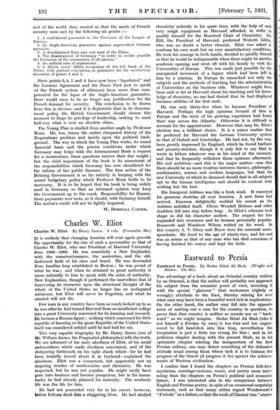Charles W. Eliot
Charles W. Eliot. By Henry James. 2 vole. (Constable, 30s.)
IT is unlikely that changing America will ever again provide the opportunity for the .rise of such a personality as that of Charles W. Eliot, who was President of Harvard University from 1869-1909. He was essentially a New Englander, with the conscientiousness, the austerities, and the old- fashioned faith of his class and breed. He was descended from families long established in Boston ; he was proud of what he was ; and when he attained to great authority it came naturally to him to speak with the mien of authority. New Englandism, though it performed the marvellous feat of impressing its character upon the structural thought of the whole of the United States no longer has an undisputed eminence, but Eliot will never be forgotten, and what he created will not die.
Few men in any country have been so much looked up to as he was after he had turned Harvard from an insufficient college into a great University renowned for its learning and research. He became a Roman figure ; nothing which concerned his little republic of learning or the great Republic of the United States itself was considered settled until he had had his say.
This very capable biography by Mr. Henry James (son of Mr. William James, the Pragmatist philosopher) tells the truth. We are informed of the early aloofness of Eliot, of his social awkwardness which made aloofness convenient, and of the disfiguring birthmark on his right cheek which—for he had been brutally teased about it in boyhood—explained the aloofness. Eliot was a competent, but apparently not an inspiring teacher of mathematics and chemistry. He was respected, but he was not popular. He might easily have gone into business and become prosperous, but in his imma- turity he had already planned his maturity. The acadeniic life was the life for him.
He had not proceeded very far in his career, however, before fortune dealt hinka staggering blow, He had studied chemistry ardently in his spare time, with the help of such very rough equipment as Harvard afforded, in order to qualify himself for the Rumford Chair of Chemistry. Dr. Hill, the President of Harvard, preferred Wolcott Gibbs, who was no doubt a better chemist. Eliot was asked to continue his own work but on very unsatisfactory conditions. He took his courage in both hands, decided to qualify himself so that he would be indispensable when there might be another academic opening and went off with his family to visit the Universities of Europe. This was made just possible by the unexpected increment of a legacy which had been left to him by a relation. In Europe he ransacked not only the subjects and the methods of teaching but the administration of Universities on the business side. Whatever might have been said so far at Harvard about his teaching and his know- ledge of chemistry, no one had denied that he had displayed business abilities of the first rank.
He was only thirty-five when he became President of Harvard. Perhaps the high opinions formed pf him in Europe and the story of his growing experience had found their way across the Atlantic. Otherwise it is difficult to account for the appointment. However that may be, Eliot's election was a brilliant choice. It is a minor matter that he preferred for Harvard the German University system to that of Oxford and Cambridge. He had not, by the way, been greatly impressed by England, which he found barbaric and poverty-stricken, though it is only fair to say that he wrote in letters whatever was in his mind at the moment, and that he frequently withdrew those opinions afterwards. His real ambition—and this is the major matter—was that there should be no more rivalries between classics, philosophy. mathematics, science and modern languages, but that the new University of which he dreamed should deal in all subjects apt to the human intelligence and should be content with nothing but the best.
His Inaugural Address was like a fresh wind. It conveyed his generous doctrine all over America. A new force had arrived. Emerson delightedly nodded his assent as the Address unfolded itself. Oliver Wendell Holmes and other doubters fell into step before long. As Eliot's schemes took shape so did his character mellow. The respect for him expanded into reverence and he became personally popular. Roosevelt and Woodrow Wilson waited on his word. In this country A. V. Dicey and Bryce were his constant corre- spondents. He lived to the age of ninety-two, and his end was as serene as that of any man who has died conscious of having finished his course and kept the faith.










































 Previous page
Previous page